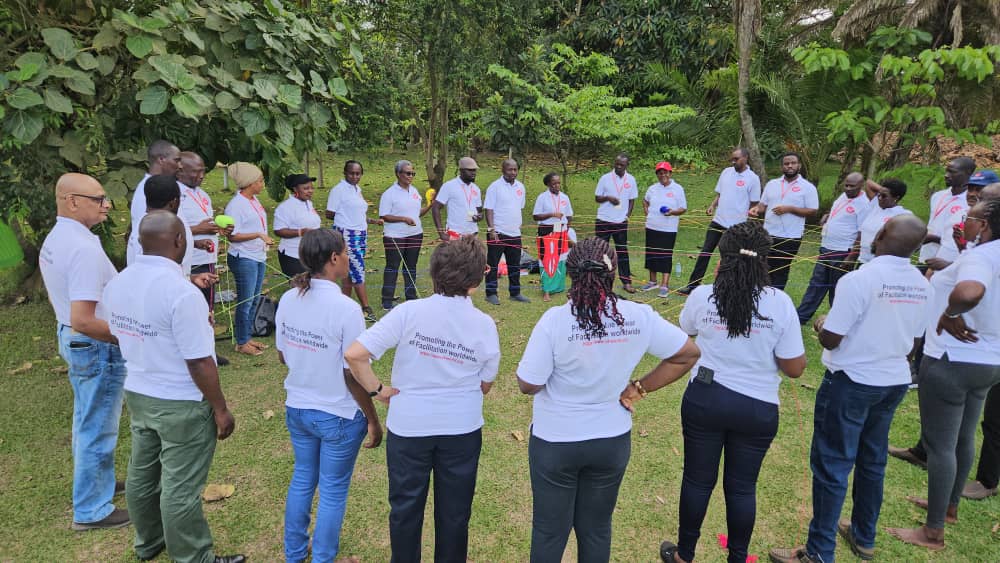
The Evolution of Facilitation in Africa: Insights from the 2024 International Association of Facilitators’ Conference.
Historically, facilitation in Africa has been deeply rooted in indigenous methods that emphasize collective decision-making, storytelling, and consensus-building. Elders and community leaders often played critical roles in guiding discussions and resolving conflicts, using their wisdom and cultural knowledge to build understanding among community members. These traditional practices were front and center during the recently concluded a three-day Africa Regional International Association of Facilitators (IAF) Conference held in Kampala, Uganda, hosted by the IAF Uganda Chapter from 23rd – 25th September 2024 in Kampala as the International Association of Facilitators (IAF) celebrates 30 years of global existence. Under the theme “Facilitation in Africa: Past, Present, and the Future,” the conference brought together over 60 facilitators, practitioners, and enthusiasts from across the continent and beyond. The countries represented at the conference included Togo, Ethiopia, Kenya, Tanzania, South Africa, Ghana, and Uganda. The conference offered community facilitators the opportunity to engage with one another, network, learn, build meaningful connections, and sharpen their skills in facilitation processes.
Reflective discussions highlighted how ancestral wisdom and cultural context continue to shape contemporary methods. “To understand where we are going, we must first acknowledge where we have come from.” This insight motivated the conference’s exploration of history, reminding participants that understanding past practices enriches present facilitation efforts. Participants were inspired by the unique contributions of various cultures to facilitation, showcasing how traditional practices can inform modern approaches.
Navigating Current Challenges and Opportunities: As discussions progressed, the conference shifted focus to the present state of facilitation across various sectors in Africa. Facilitators addressed the challenges posed by political instability, economic disparities, and social unrest, emphasizing the need for adaptive strategies.
“Facilitation is about guiding conversations and creating safe spaces where voices can be heard, especially in times of crisis.” This perspective highlighted facilitators’ critical role as agents of change, using their skills to promote dialogue and understanding in divided communities. Current challenges were mirrored in ongoing facilitation efforts throughout the continent. Facilitators often encounter situations where certain voices dominate discussions, silencing others. To counter this, skilled facilitators employ techniques that encourage equitable participation, such as round-robin sharing or small group discussions. By ensuring that all voices are heard, they create environments where everyone feels valued and respected. The conference also showcased successful case studies demonstrating facilitation’s versatility in driving social change. With support from Uganda National NGO Forum, grassroots organizations in Uganda shared their experiences of empowering communities through collaborative problem-solving, instilling hope and inspiration among participants.
With technology and globalization rapidly evolving, facilitators are called to adapt their methods. Discussions focused on integrating digital tools and online platforms to enhance facilitation processes, particularly in a post-pandemic world. “The future of facilitation lies in our ability to harness technology while staying true to our core values.” This call to action resonated with participants, underscoring the importance of blending innovation with cultural sensitivity to ensure facilitation remains accessible and meaningful. As we look to the future, the role of facilitators in Africa will continue to evolve. Emerging trends and innovations are shaping the landscape of facilitation, prompting practitioners to rethink their approaches and methodologies. Key considerations for the future include:
- Integration of Technology: The COVID-19 pandemic accelerated the adoption of digital tools in facilitation. Facilitators must harness these technologies to enhance engagement and communication. Blended approaches, combining in-person and online facilitation, can expand reach and accessibility.
- Focus on Inclusivity and Diversity: The future of facilitation must prioritize inclusivity, ensuring that marginalized voices are heard. Facilitators should actively seek out diverse perspectives and create spaces where everyone feels safe to share their experiences and ideas.
- Emphasis on Sustainability: As global challenges such as climate change and social inequality become increasingly urgent, facilitators have a role in promoting sustainable practices. This includes integrating environmental considerations into facilitation processes and encouraging participants to explore solutions that benefit both people and the planet.
- Collaboration Across Borders: The interconnectedness of today’s world calls for collaboration among facilitators across borders. By sharing knowledge, experiences, and best practices, facilitators can learn from one another and enhance their effectiveness in addressing complex challenges.
Building Connections and Community
Beyond the rich discussions and insights, Facilitators forged connections that will contribute to a robust community of practice across Africa. In her closing remarks, IAF President Ms. Jennifer L. Becker emphasized the importance of continued collaboration: “Together, we can create a future where facilitation transcends borders, fostering understanding and cooperation among diverse communities.”
The insights gained from the IAF Africa Conference will undoubtedly inform and enhance facilitation practices. This is a call to action for facilitators, practitioners, and anyone interested in the power of facilitation: let us continue to learn from our history, adapt to our present, and boldly envision a future where facilitation empowers all voices in our communities.



